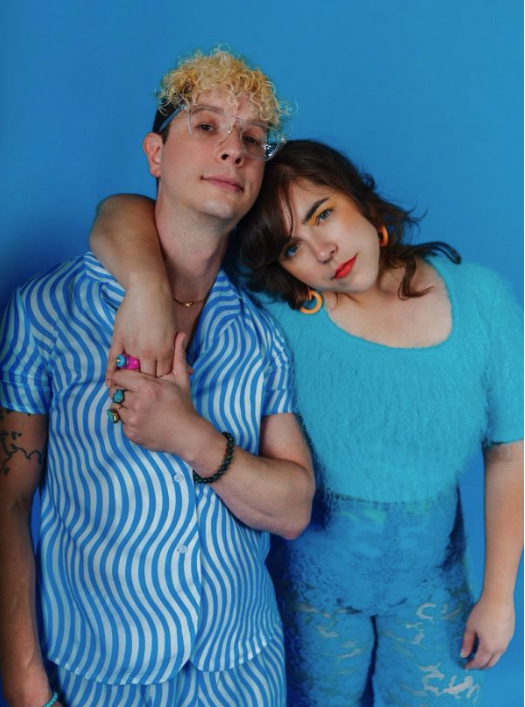Last Night: You're Amanda Palmer and Vice Versa

What crowdsourced musicians give Amanda Palmer - in addition to free labor.
[See Comments for Update] Steve Albini and the critics of Amanda Palmer's plan to crowdsource the horns and strings that will join her in each city on her "Theatre is Evil" tour miss the point. Sure, she can pay them more than beer, merch and free plugs, but her method of payment almost guarantees that she'll get people who want to be there - people who are fans or people who share her sense of theater. In short, she puts the audience onstage, though it was always onstage in her.
Palmer's made a living by breaking down the distance between her and her audience, whether economically by appealing to them to fund her music, or literally by appearing naked before them. Last night at Tipitina's, she literally put herself in her audience's hands by crowdsurfing in a gray dress with a long train that fanned out over the crowd who'd passed her on. More than once, she stood center stage and opened her arms wide, vulnerable to the crowd (though the "here I am" gesture usually seemed more defiant.)
The audience responded to the show with the same sort of passion that led to her raising more than a million dollars through Kickstarter to finance Theatre is Evil. When her bass player in the first of three show-related opening acts asked the crowd to sing a part, not only did it do so but it did it for the duration of the song. That sort of love carried over throughout the set, and when Boston saxophone duo Ronald Reagan led a short set of '80s hits - "Take on Me," "Total Eclipse of the Heart" and "Don't Stop Believin'" - the audience sang along with open-throated passion. If Amanda Palmer loved something or someone, the audience loved it/them too.
I don't find Palmer's dark carnival and new wave particularly sexy, but many did. There were straight and gay couples getting physical at her show, which is clearly a tribute to atmosphere she creates. For that and a host of other reasons, I kept trying to think of meaningful ways in which she's different from Lady Gaga other than musical styles and the sizes of their followings. Empowerment is a subtext for both of them and they handle it with an equal lack of humor and humility.
Palmer gave good value last night, playing for more than two hours. Since I don't have a yearning, misunderstood steampunk inside me, that was more than I needed. On the merits alone, I was with Palmer for 45 minutes to an hour before it seemed like I'd heard what she had to offer. Then and throughout the night, she made her limited voice work for her, and her songs - particularly those from the new album -are good, guitar-oriented '80s new wave rock. The crowd-surfing moment seemed like the end of the show, and after that it started repeating itself, including the return of Ronald Reagan to play "Careless Whispers."
The show's lone misstep came when Palmer strained to make the connection with her audience by reading cards identifying bad things that had happened to audience members. I suspect the fragile, broken voice she adopted for the bit was to be heard as tender and sympathetic, but nothing in her stage persona said Palmer does tender. Instead, the moment came off as deeply faux - an attempt to wring precious drama out of the passably dramatic.
As for the ad hoc musicians, they appeared to have a great time. Sam Craft plugged Alexis and the Samurai and Alexis Marceaux's appearance on The Voice (guess I have to watch now), and Ashley Shabankareh and Hannah Krieger-Benson hyped an upcoming Local Skank show at the AllWays Lounge. The tuba player was Matt Owen, who has followed the tour from city to city to be her tuba player and to plug his act, Matt Owen and the Eclectic Tuba. Palmer brought up members of the St. Cecilia's Asylum Chorus to sing about taking care of your pubic hair in "Map of Tasmania."
The irony is that the good-natured performances by the local guests underscored the problematic truth that Palmer faces just as Lady Gaga does. Her humorlessness says that more than just the barricade at the lip of the stage separates her from her people. She can work to diminish the gap between her and them, but she not make it go away. And really, she wouldn't want to.






